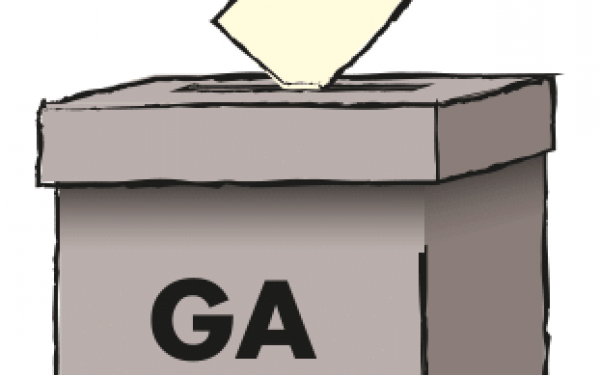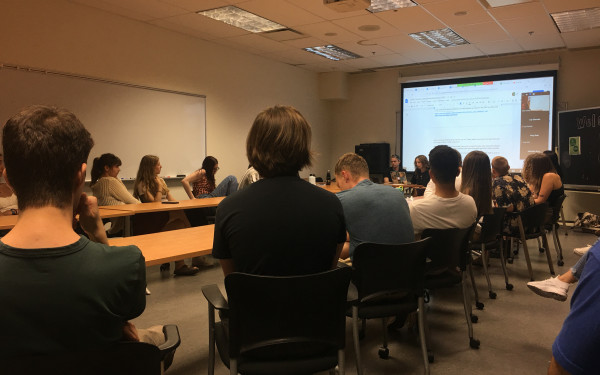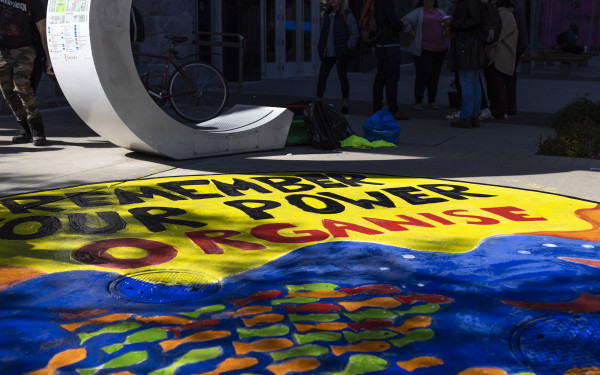Four More Student Associations Vote for Fall Reading Week Strike
The Results of Four Additional Student Strike Votes Are In
Between Sept. 14 and Sept. 16, students in the biology, chemistry, biochemistry, physics, journalism, community and public affairs, immigration studies, and First Peoples studies programs voted to strike for a fall reading week.
The Arts and Science Federation of Associations has been rallying its member associations and coordinating plans for strike votes. The groups who voted in favour will likely be joined by more as general assemblies take place over the coming weeks.
CUBCAPS General Assembly
Although it took them over 30 minutes to meet their association’s mandated quorum, students in the Concordia Undergraduate Biochemistry, Chemistry and Physics Society made time to show up and vote for their strike motion.
On Sept. 14, CUBCAPS became the third member association of ASFA to vote on a fall reading week strike. After some moderate debating, especially over the logistics and specifics of the strike, students voted in favour of the motion. Nineteen voted in favour, while two opposed the motion.
Rami Zemouri, the vice-president of academics for physics students, reiterated the importance of voting on the motion. “For a few years now, Concordia has said they'd be implementing a fall reading week: it’s been four years.”
“The reason they didn’t implement [one] this year,” Zemouri claimed, “was to raise awareness for next year’s reading week. This is barely a good reason.”
Considering the unique circumstances of programs like chemistry and physics, students voted to amend the strike motion. This amendment would exempt labs from the strike: any students needing to tend to their laboratory work would not be crossing the picket line.
JSA General Assembly
The Journalism Student Association held their annual general assembly on Thursday Sept. 15, at 5:15 p.m.. A call to strike for a fall reading week was passed. An amendment to the agenda to include a climate strike was passed as well.
Because it has been a long time since the JSA's previous strike, the association expects students to have many questions. Autumn Darey, executive of social, said the JSA will be posting on social media and emailing students to let them know what they will need to do while striking.
“The reason why we wanted to pass this is not just so that students would vote to strike, but to give them a choice to strike. Because of COVID-19, it has been harder to be involved in student life. We wanted to show students that they can do this and have an impact,” said Darey.
An amendment to the by-law concerning conflicts of interest was passed. The amendment will inhibit members of the JSA to be executive members of student papers. “The vote went well, as long as students are happy,” said Darey.
SCPASA General Assembly
The School of Community and Public Affairs Student Association held its general assembly on Sept. 15 at the Hive Café Co-op at 6 p.m.. On the agenda was the highly anticipated motion to strike for a Fall 2022 reading week.
“We didn’t have that much of a history—especially during COVID—of being as active, so when this committee was brought together, it [showed] how interested people were actually in striking,” said Hana Sherafati Zanganeh, SCPASA’s Communications Secretary.
During a discussion on one point in the agenda, which asked the question of how best to serve the needs of students in the First People’s Studies program, a student motioned for FPST to be included in the vote taking place later in the evening.
The student wished to emphasize the existence of FPST within the SCPASA, so there would be no question as to whether their program would go on strike as well. The motion was seconded, with 23 votes in favour, zero opposed, and three abstaining.
Veronica Galavis, SCPASA’s social affairs secretary, mentioned how they have been organizing these types of strikes for a long time. Galavis cites last semester’s “trial strike” as an example, where SCPASA mobilized and striked to advocate for free education and decolonial climate action.
“I would be voting for a strike. It’s important to exercise your democratic rights as a student. I’m sick of hearing promises from Concordia that are not being met,” said Ella Albers, a second-year student part of the SCPA.
Twenty-one students voted in favour of passing the motion to participate in the Fall 2022 reading week. Five voted against the strike, while five abstained.
“[Concordia] was intimidated by us being on strike in March, just one small student association, and so the fact that we’re [now] working with a ton of other ones towards the same goal, they should be nervous, '' added Lacey Boudreau, the academic affairs and advocacy secretary.
BSA General Assembly
The Biology Student Association held its general assembly in a hybrid format on Sept. 16. Around 10 students gathered in a conference room in the Centre for Structural and Functional Genomics building at the Loyola campus, while around two dozen joined via Zoom.
The BSA joined the Urban Planning Association as the only two associations to vote on the fall reading week strike without a single opposition vote. Twenty-seven BSA students voted to strike, and four students abstained.
Vice-President of Finance Melissa Siclait reiterated the importance of such a strike. “Ever since 2019, Concordia has agreed to give us a reading week, but they kept pushing back the date. Other universities have it, but we don’t.”
“We think it'll be beneficial for students because after the pandemic people are way more stressed out. You deserve a week off,” Siclait added.
Solidarity was a big sticking point for BSA President Max Kerby Henry Edmond. “If all of us are united, the administration cannot divide us. If we vote for the strike, our power dynamic changes: we have more power together,” he said.
A provision in the strike motion was set out to exclude laboratories from the strike, as was done in the CUBCAPS motion.
After the vote passed, a second motion was presented by the executives. The BSA voted unanimously to donate $200 to the First Nations Child and Family Caring Society of Canada as a show of solidarity between the association and Indigenous communities.
Disclaimer: Zachary Fortier is a journalism student and therefore a member of the Journalism Student Association. He was not involved in any of the reporting or editing in relation to the portion of this article on the JSA.

_900_555_90.jpg)



_600_375_90_s_c1.jpg)

